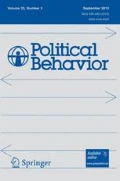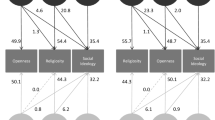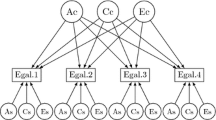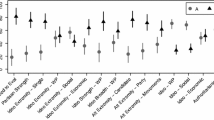Abstract
Social scientists have long recognized and sought to explain a connection between religious and political beliefs. Our research challenges the prevalent view that religion and politics constitute separate but related belief sets with a conceptual model that suggests the correlation between the two may be partially explained by an underlying psychological construct reflecting first principle beliefs on social organization. Moreover, we also push this challenge further by considering whether part of the relationship between political and religious beliefs is the result of shared genetic influences, which would suggest that a shared biological predisposition, or set of biological predispositions, underlies these attitudes. Using a classic twin design on a sample of American adults, we demonstrate that certain religious, political, and first principle beliefs can be explained by genetic and unique environmental components, and that the correlation between these three trait structures is primarily due to a common genetic path. As predicted, this relationship is found to hold for social ideology, but not for economic ideology. These findings provide evidence that the overlap between the religious and the political in the American context may in part be due to underlying principles regarding how to understand and organize society and that these principles may be adopted to satisfy biologically-influenced psychological needs.




Similar content being viewed by others
Notes
This paper will focus on Christianity as its primary religious system as it is the overwhelming majority religion in the United States (Wald and Calhoun-Brown 2007).
Religious affiliation (identification of Protestant, Catholic, etc.) is excluded from this analysis because the categories are too broad to tap into dimensions related to the overlap between religious and political beliefs. The other two religious options were self-identification as born again, which we excluded because it is a dichotomous variable and the methods used here assume normality, and self-identification as a spiritual person, which we excluded due its lack of variance (85 % of the sample indicated yes, they were spiritual, including a number of religious individuals).
Because the results presented here are reported as a percent of the variance accounted for in a trait, the confidence interval on these estimates cannot extend below zero. To determine if a coefficient is significant, we utilized the 95 % confidence interval around the standardized path coefficients reported in Tables 1, 2, and 3 of the Supplementary material.
We do not report results for the leadership subscale because the low variance and high skew in this sample render this variable inappropriate for methods that assume normality.
For the full scale and group subscale of the Society Works Best index, the MZ correlation is more than twice the DZ correlation. This suggests that it may be more appropriate to run ADE models for these variables, which estimate dominance effects (D) that capture certain types of gene by gene interactions instead of common environment effects. However, because it is not possible to estimate common environment and dominance effects simultaneously without an extended twin family design, and because our hypotheses do not hinge on whether the genetic effects that we are examining are additive or non-additive, we instead report ACE and AE models for all variables. In these models, we interpret the A as an estimate of broad-sense heritability, which includes both additive and non-additive genetic effects (see Coventry and Keller 2005).
The lower reliability of the economic ideology measure likely contributes to the higher unique environment component (E) in this measure. However, despite the lower reliability, we are able to find significant genetic effects on economic preferences in many of the analyses. Moreover, economic ideology may simply have less internal consistency than social ideology or suffer from greater measurement error (Ansolabehere, Rodden, and Snyder 2008), as evidenced by the lower median heritability among the single economic items as compared to the single social items.
For the relationship with social ideology and economic ideology, we can determine the proportion of variance in religious importance that is unshared with these variables by re-ordering the variables in the model so that religious importance is the second variable. This procedure is discussed in greater detail in the trivariate analysis section.
References
Alford, J. R., Funk, C. L., & Hibbing, J. R. (2005). Are political orientations genetically transmitted? American Political Science Review, 99(2), 153–167.
Alford, J. R., & Hibbing, J. R. (2007). Personal, interpersonal, and political temperaments. The ANNALS of the American Academy of Political and Social Science, 614(1), 196–212.
Altemeyer, R. (1981). Right-wing authoritarianism. Winnipeg, Canada: University of Manitoba Press.
Ansolabehere, Stephen, Rodden, Jonathan, & Snyder, James M, Jr. (2008). The strength of issues: Using multiple measures to gauge preference stability, ideological constraint, and issue voting. American Political Science Review, 102(2), 215–232.
Boker, S., Neale, M., Maes, H., Wilde, M., Spiegel, M., Brick, T., et al. (2011). OpenMx: An open source extended structural equation modeling framework. Psychometrika, 76(2), 306–317.
Bouchard, T. J. (2009). Authoritarianism, religiousness, and conservatism: Is ‘obedience to authority’ the explanation for their clustering, universality and evolution? In E. Voland & W. Schiefenhövel (Eds.), The biological evolution of religious mind and behavior (pp. 165–180). London: Springer.
Bouchard, T. J, Jr, McGue, M., Lykken, D., & Tellegen, A. (1999). Intrinsic and extrinsic religiousness: Genetic and environmental influences and personality correlates. Twin Research, 2(2), 88–98.
Bradshaw, M., & Ellison, C. G. (2008). Do genetic factors influence religious life? findings from a behavior genetic analysis of twin siblings. Journal for the Scientific Study of Religion, 47(4), 529–544.
Carmines, E. G., Ensley, M. J., & Wagner, M. W. (2012). Who fits the left-right divide? partisan polarization in the American Electorate. American Behavioral Scientist, 56(12), 1631–1653.
Clark, C. A., & Worthington, E. L, Jr. (1990). Family variables affecting the transmission of religious values from parents to adolescents: A review. In B. K. Barber & B. C. Rollins (Eds.), Parent-adolescent relationships (pp. 167–191). Lanham, MD: University Press of America.
Converse, P. E. (1964). The nature of belief systems in mass public. In D. Apter (Ed.), Ideology and discontent (pp. 206–261). New York: Free Press.
Cornwall, M. (1989). the determinants of religious behavior: A theoretical model and empirical test. Social Forces, 68(2), 572–592.
Coventry, W. L., & Keller, M. C. (2005). Estimating the extent of parameter bias in the classical twin design: A comparison of parameter estimates from extended twin-family and classical twin designs. Twin Research and Human Genetics, 8(03), 214–223.
Downs, A. (1957). The Causes and Effects of Rational Abstention. In An Economic Theory of Democracy. New York: Harper and Row (pp. 260-276).
Eaves, L. J., Hatemi, P. K., Prom-Womley, E. C., & Murrelle, L. (2008). Social and genetic influences on adolescent religious attitudes and practices. Social Forces, 86(4), 1621–1646.
Ellis, C., & Stimson, J. A. (2011). Pathways to conservative identification. In P. M. Sniderman & B. Highton (Eds.), Facing the challenge of democracy: Explorations in the analysis of public opinion and political participation (pp. 120–148). Princeton, NJ: Princeton University Press.
Emerson, M. O., & Smith, C. (2000). Divided by faith: Evangelical religion and the problem of race in America. Oxford: Oxford University Press.
Feldman, S. (2003). Enforcing social conformity: A theory of authoritarianism. Political Psychology, 24, 41–74.
Feldman, S., & Johnston, C. (2014). Understanding the determinants of political ideology: Implications of structural complexity. Political Psychology, 35(3), 337–358.
Fowler, J. H., & Dawes, C. T. (2008). Two genes predict voter turnout. The Journal of Politics, 70(3), 579–594.
Francis, Leslie J. (2010). Personality and religious orientation: Shifting sands or firm foundations? Mental Health, Religion, and Culture, 13(7/8), 793–803.
Friesen, A., & Wagner, M. W. (2012). Beyond the “Three Bs”: How American Christians approach faith and politics. Politics and Religion, 5(2), 224–252.
Funk, C. L., Smith, K. B., Alford, J. R., Hibbing, M. V., Eaton, N. R., Krueger, R. F., et al. (2013). Genetic and environmental transmission of political orientations. Political Psychology, 34, 805–819.
Haidt, J. (2012). The righteous mind: Why good people are divided by politics and religion. New York: Pantheon Books.
Hatemi, P., Medland, S., Morley, K., Heath, A., & Martin, N. (2007). The genetics of voting: An Australian twin study. Behavior Genetics, 37(3), 435–448.
Hibbing, J. R., Smith, K. B., & Alford, J. R. (2014). Predisposed: Liberals, conservatives, and the biology of political differences. New York: Routledge.
Hills, Peter, Francis, Leslie J, Argyle, Michael, & Jackson, Chris J. (2004). Primary personality trait correlates of religious practice and orientation. Personality and Individual Differences, 36(1), 61–73.
Hunter, J. D. (1991). Culture wars: The struggle to define America. New York: Basic Books.
Jennings, M. K., & Niemi, R. G. (1974). The political character of adolescence: The influence of families and schools. Princeton, NJ: Princeton University Press.
Jennings, M. K., Stoker, L., & Bowers, J. (2009). Politics across generations: Family transmission reexamined. The Journal of Politics, 71(3), 782–799.
Jost, J. T. (2006). The end of the end of ideology. American Psychologist, 61(7), 651–670.
Jost, J. T., Glaser, J., Kruglanski, A. W., & Sulloway, F. J. (2003). Political conservatism as motivated social cognition. Psychological Bulletin, 129(3), 339–375.
Kendler, K. S., Liu, X.-Q., Gardner, C. O., McCullough, M. E., Larson, D., & Prescott, C. A. (2003). Dimensions of religiosity and their relationship to lifetime psychiatric and substance use disorders. American Journal of Psychiatry, 160(3), 496–503.
Kenneth, Kendler, & Myers, John. (2009). A developmental twin study of church attendance and alcohol and nicotine consumption: A model for analyzing the changing impact of genes and environment. American Journal of Psychiatry, 166(10), 1150–1155.
Kirk, K. M., Maes, H. H., Neale, M. C., Heath, A. C., Martin, N. G., et al. (1999). Twin research: The official journal of the International Society for Twin Studies. 2(2), 99–107.
Koenig, L. B., & Bouchard, T. J. (2006). Genetic and environmental influences on the traditional moral values triad—authoritarianism, conservatism, and religiousness—as assessed by quantitative behavior genetic methods. In P. McNamara (Ed.), Where god and science meet: How brain and evolutionary studies alter our understanding of religion (Vol. 1, pp. 31–60). Westport, CT: Praeger.
Layman, G. C. (2001). The great divide: Religious and cultural conflict in American party politics. New York: Columbia University Press.
Loehlin, J. C. (1996). The Cholesky approach: A cautionary note. Behavior Genetics, 26(1), 65–69.
Ludeke, S., Johnson, W., & Bouchard, T. J, Jr. (2013). “Obedience to traditional authority:” A heritable factor underlying authoritarianism, conservatism and religiousness. Personality and Individual Differences, 55(4), 375–380.
McFarland, S. (1998). Communism as religion. International Journal for the Psychology of Religion, 8(1), 33–48.
Medland, S. E., & Hatemi, P. K. (2009). Political science, biometric theory, and twin studies: A methodological introduction. Political Analysis, 17(2), 191–214.
Miller, G., & Schofield, N. (2003). Activists and partisan realignment in the United States. American Political Science Review, 97(2), 245–260.
Mockabee, S. T., Wald, K. D., & Leege, D. C. (2012). In search of the religious left: Re-examining religiosity. In J. Aldrich & K. McGraw (Eds.), Improving public opinion surveys: Interdisciplinary innovation and the American National Studies (pp. 278–298). Princeton, NJ: Princeton University Press.
Mondak, Jeffery J. (2010). Personality and the foundations of political behavior. New York: Cambridge University Press.
Putnam, R. D., & Campbell, D. E. (2012). American grace: How religion divides and Unites Us. New York: Simon and Schuster.
Ray, J. J. (1989). The scientific study of ideology is too often more ideological than scientific. Personality and Individual Differences, 10(3), 331–336.
Robbins, Mandy, Francis, Leslie, McIlroy, David, Clarke, Rachel, & Pritchard, Lowri. (2010). Three religious orientations and five personality factors: An exploratory study among adults in England. Mental Health, Religion and Culture, 13(7–8), 771–775.
Saroglou, Vassilis. (2002). Religion and the five factors of personality: A meta-analytic review. Personality and Individual Differences, 32, 15–25.
Saucier, G., & Goldberg, L. R. (1998). What is beyond the big five? Journal of Personality, 66, 495–524.
Settle, J. E., Dawes, C. T., Christakis, N. A., & Fowler, J. H. (2010). Friendships moderate an association between a dopamine gene variant and political ideology. The Journal of Politics, 72(4), 1189–1198.
Smidt, C. E., den Dulk, K. R., Froehle, B. T., Penning, J. M., Monsma, S. V., & Koopman, D. L. (2010). The disappearing God gap? Religion in the 2008 presidential election. Oxford, UK: Oxford University Press.
Smidt, C. E., Kellstedt, L. A., & Guth, J. L. (2009). The role of religion in American politics: Explanatory theories and associated analytical and measurement issues. In C. E. Smidt, L. A. Kellstedt, & J. L. Guth (Eds.), The Oxford handbook of religion and American politics (pp. 3–42). Oxford: Oxford University Press.
Smith, K., Alford, J. R., Hatemi, P. K., Eaves, L. J., Funk, C., & Hibbing, J. R. (2012). Biology, ideology, and epistemology: How do we know political attitudes are inherited and why should we care? American Journal of Political Science, 56(1), 17–33.
Smith, K. B., Oxley, D. R., Hibbing, M. V., Alford, J. R., & Hibbing, J. R. (2011a). Disgust sensitivity and the neurophysiology of left-right political orientations. PLoS ONE, 6(10), 1–9.
Smith, K. B., Oxley, D. R., Hibbing, M. V., Alford, J. R., & Hibbing, J. R. (2011b). Linking genetics and political attitudes: Reconceptualizing political ideology. Political Psychology, 32(3), 369–397.
Snow, D. A., Rochford, E. B, Jr, Worden, S. K., & Benford, R. D. (1986). Frame alignment processes, micromobilization, and movement participation. American Sociological Review, 51(4), 464–481.
Tedin, K. L. (1974). The influence of parents on the political attitudes of adolescents. The American Political Science Review, 68(4), 1579–1592.
Thomas, L. E. (1971). Political attitude congruence between politically active parents and college-age children: An inquiry into family political socialization. Journal of Marriage and Family, 33(2), 375–386.
Truett, K. R., Eaves, L. J., Meyer, J. M., Heath, A. C., & Martin, N. G. (1992). Religion and education as mediators of attitudes: A multivariate analysis. Behavior Genetics, 22(1), 43–62.
Vance, T., Maes, H. H., & Kendler, K. S. (2010). Genetic and environmental influences on multiple dimensions of religiosity. The Journal of Nervous and Mental Disease, 198(10), 755–761.
Verhulst, B., Eaves, L. J., & Hatemi, P. K. (2012). Correlation not Causation: The relationship between personality traits and political ideologies. American Journal of Political Science, 56(1), 34–51.
Wald, K. D., & Calhoun-Brown, A. (2007). Religion and American politics in the United States (5th ed.). Lanham, MD: Rowman and Littlefield.
Wilson, G. D., & Patterson, J. R. (1968). A new measure of conservatism. British Journal of Social and Clinical Psychology, 7(4), 264–269.
Wuthnow, R. (1988). The restructuring of American religions: Society and faith since World War II. Princeton, NJ: Princeton University Press.
Zuckerman, A. S., Dasović, J., & Fitzgerald, J. (2007). Partisan families: The social logic of bounded partisanship in Germany and Britain. Cambridge: Cambridge University Press.
Acknowledgments
The data employed in this project is publicly available and collected with the financial support of the National Science Foundation in the form of SES-0721378, PI: John R. Hibbing; Co-PIs: John R. Alford, Lindon J. Eaves, Carolyn L. Funk, Peter K. Hatemi, and Kevin B. Smith, and with the cooperation of the Minnesota Twin Registry at the University of Minnesota, Robert Krueger and Matthew McGue, Directors.
Author information
Authors and Affiliations
Corresponding author
Electronic supplementary material
Below is the link to the electronic supplementary material.
Rights and permissions
About this article
Cite this article
Friesen, A., Ksiazkiewicz, A. Do Political Attitudes and Religiosity Share a Genetic Path?. Polit Behav 37, 791–818 (2015). https://doi.org/10.1007/s11109-014-9291-3
Published:
Issue Date:
DOI: https://doi.org/10.1007/s11109-014-9291-3




